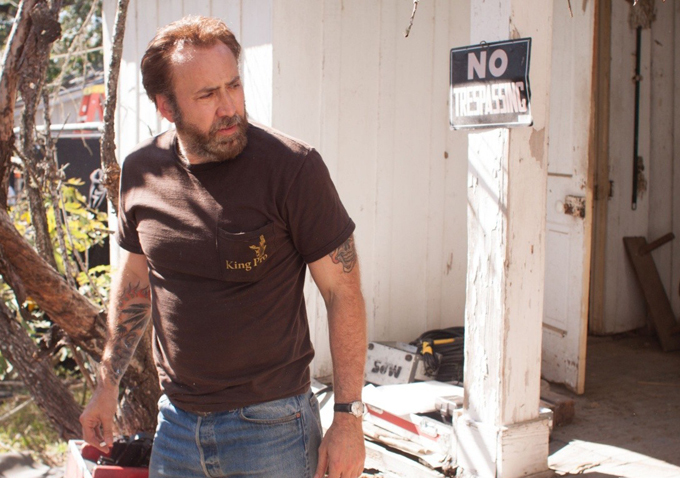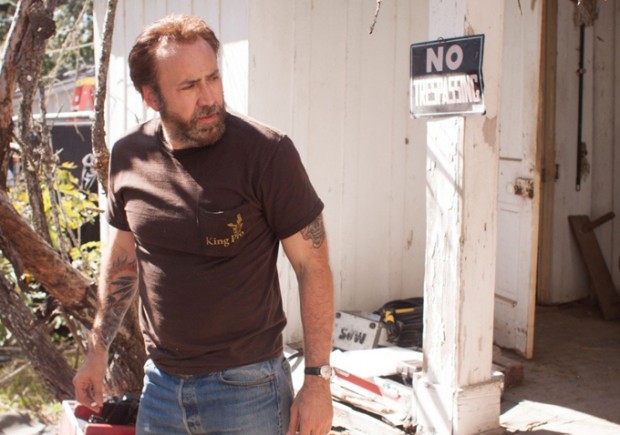
Hitting limited release and VOD this week is Joe, the latest film from director David Gordon Green, starring Nicolas Cage and Tye Sheridan. Based on Larry Brown‘s novel, the story follows a young boy trying to make his way in life and get away from his abusive, drunken father when he runs into a foreman that poisons trees in Texas. The foreman is kind and protective, but has some serious anger issues that keep him from getting very far in life. Sincerely, it’s one of Cage’s best films in some time and a showcase that he still has remarkable talent.
After the SXSW premiere of the film I was able to attend a press conference with Green, Cage, and Sheridan to discuss the film. Among the various topics were the way this film and Green’s last film, Prince Avalanche, feel like they share some DNA beyond just the director, the way that Green incorporates pieces of the actors into their characters, the importance of the facial hair that Cage sports and whether it was real or not, what kind of personal experiences Cage and Green brought to the film, and much more. It’s a fascinating read for those wanting some background before going into the film and I also ask about one of the funniest moments in the film: the “pain face,” and where it came about. Enjoy the full conversation below and read our TIFF review here.
Can you talk a little about finding the different locations you used and the people you interacted with? In particular Gary Poulter, because he’s so terrific in the film.
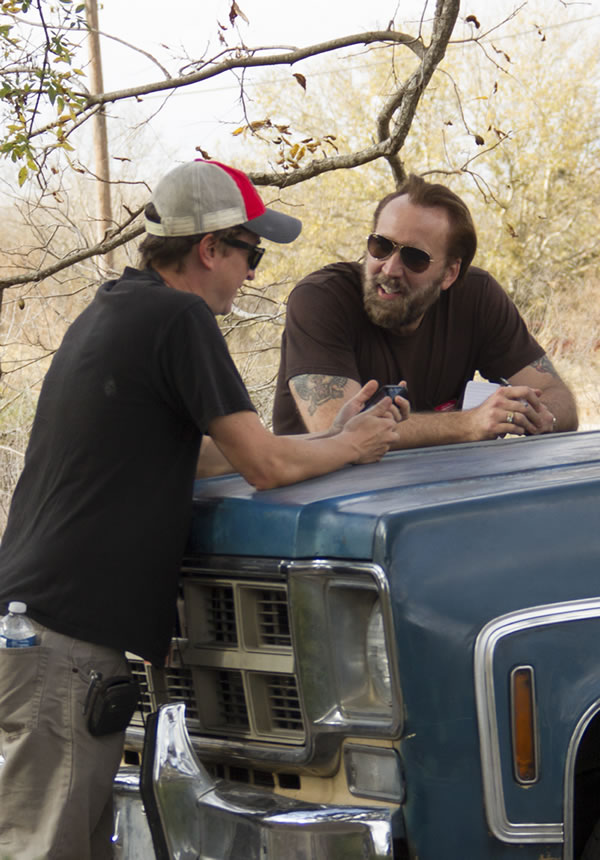 David Gordon Green: I remember when Nic came to town we were talking about how to flesh out the cast and I really wanted it to have a raw southern authenticity and not necessarily a Hollywood polish. I wanted to make sure these characters felt like they were from the real world and we were dropping in on guys that knew how to do this labor and had these voices of either poetry or horror, depending on who we were looking at. Outside of Nic, it’s all Texans, people that were living here and had the voice of here. We’d go in the morning down to town — it was all shot in and around the Austin area — we’d go down downtown to the day labor center in the morning and there’s construction foreman looking for guys on the job and people with landscaping needs looking for guys and we’d be out there gathering some guys for our job. So we’re casting based on their face and their voice and it were taking a leap of faith. It was the instinct of me and my casting directors, who were really unique, really visionary in their length and detail of looking for fresh faces. We also did traditional casting and there’s a lot of really talented local actors, Adriene Mishler, Heather Kafka, and Tana Morris.
David Gordon Green: I remember when Nic came to town we were talking about how to flesh out the cast and I really wanted it to have a raw southern authenticity and not necessarily a Hollywood polish. I wanted to make sure these characters felt like they were from the real world and we were dropping in on guys that knew how to do this labor and had these voices of either poetry or horror, depending on who we were looking at. Outside of Nic, it’s all Texans, people that were living here and had the voice of here. We’d go in the morning down to town — it was all shot in and around the Austin area — we’d go down downtown to the day labor center in the morning and there’s construction foreman looking for guys on the job and people with landscaping needs looking for guys and we’d be out there gathering some guys for our job. So we’re casting based on their face and their voice and it were taking a leap of faith. It was the instinct of me and my casting directors, who were really unique, really visionary in their length and detail of looking for fresh faces. We also did traditional casting and there’s a lot of really talented local actors, Adriene Mishler, Heather Kafka, and Tana Morris.
The difficult part of this movie in putting the cast together in a lot of ways was to find the character to play Tye’s father in the movie. I just knew I needed a movie star of the magnitude of Cage and I needed a fresh face, young voice, super energy, young character for the Gary character. Gary Poulter, the gentlemen who played his father, I just didn’t want the cynical hollywood villain. I wanted somebody that felt sad in a way and had a depth and darkness behind his eyes rather than just a guy that was going to role up his sleeves and chew on a bad guy role. We looked at some incredible, well-known actors for the part. For those familiar with the novel, it’s a very memorable, notable character of southern literature, so we really needed just to finesse the casting process. Our casting directors met Gary Poulter at a bus stop here downtown. He was just waiting for the bus and he was actually on his way back from his father’s funeral. He had been living on the streets downtown for quite a while and had a lot of hardships and had a lot of stories to tell and a wonderful charisma and positive ambition to bring the table and was looking for a new step in life. It was amazing to work with him. I introduced him to Cage, we had breakfast one morning, and they hit it off. I introduced him to Tye and they hit it off. We just had a wonderful time working with him.
Nicolas Cage: It’s a little sad because I said to Gary, “Just keep it together for one year. Just one year and your life is going to change dramatically. You’re going to get all kinds of phone calls and you’re going to be making all kinds of movies.”
Can you also talk a little bit about what David was saying about working with the real people, the people off the street, as opposed to working with other actors and what that was able to add to the authenticity?
Cage: The thing is that everybody I worked with had tremendous work ethic. Gary Poulter had work ethic. He had the Vincent Price smile on from The Black Widow Alice Cooper album down. He would perform all the time. He was a real, trained street performer. So when I was ready to work, he was ready to work, and vice versa. It didn’t feel that much different than working someone out of Juliard. He was on point.
Joe had all of these inner demons it seemed, but he also was an everyday man. I’m just curious in your own life, what do you bring to a character like that?
Cage: The great news was that when I read the script I knew right away this was something were I wouldn’t have act too much. I could bring whatever my life experiences were from the last two years into the role. When my wife saw the movie when it premiered, I think in Venice she said, “Well, that’s you.”
I was wondering what drew you into a making a picture about community violence, where problems are often solved through aggression rather than reasoning. Is there something in your background?
Green: When I read the script it struck me as a great contemporary western, a genre that I’ve always been drawn to and love. This story particularly was based on a novel by Larry Brown and when I was in college a film professor of mine named Gary Hawkins introduced me to Larry’s work as a southern writer among other writers, like Harry Crews and Barry Hannah and Tom Franklin, a lot of great writers. Cormac McCarthy has really escalated and guys like Charles Portis that are amazing, and when you dust them off they’re beautiful literature. I worked on a documentary on Larry, the novelist’s life, so I got to know Larry when he was alive. My professor did the adaption of the novel after Larry passed away. My professor, in honor of Larry, said, “I want to take a stab at Joe because that’s the one I find the most personal.” The most personal to Larry, the most personal to himself. It’s a story very distant from me, but it’s something that really resonated with a lot of relevance to me. I felt very familiar with this world even though I can’t say I’ve grown up in the squalor of Tye’s character, can’t quite stay I’m the bad-ass and masculine as Nic’s character, but it’s people I look up to and I wonder about them. Even the horrific characters or some of the quirkier characters are people I’ve, in my strange life, met along the way. I’d love to explore and take these steps in their shoes.
It’s almost as if the roles were made for them…
Green: I talked about the authenticity of the raw, untrained actors but it’s great when you have actors that can find within them depths of reality that trigger something that audiences… it’s the reason we go to the movies. To see guys like these guys, invite us into our lives and experience characters through their eyes and that’s the most rewarding part about a movie like this; getting into the ring with Nic and Tye and bringing a story that’s very passionate and I have a great history with to life.
Cage: One of the great things about working with David is that he will interview his actors. He’ll invite little stories that you may recall from your own lives and just put them in the film so it gets that feeling of spontaneity and feeling of life actually happening as opposed to just sort of acting it. Little memories, little bits and pieces, little bits of dialogue, little thoughts or experiences that actors can put in the performance so you don’t have to act so much, which is very much a part of the process working with David.
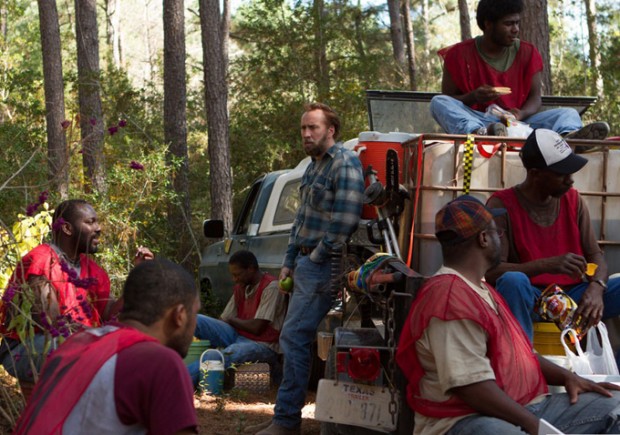
I have a question for Tye. You have had a pretty remarkable start to your career, something that a lot of actors couldn’t even dream of having right off the bat. What did you find unique about working with David and Nic? Did you learn anything new in your experience on this film?
Tye Sheridan: Absolutely. I like working with David because, like Nic said, he incorporates specific and realness and honesty into his films. He’s very spontaneous. I remember one time he told me he had a booger. Nic is just a true professional and has had a great career over a number of years. I look up to him and is one of my role models.
David said something about you being in a point in his career that is perfect for the film…
Green: Perfect for me to mess around him. Sometimes people get a little manicured. It’s fun to find someone that’s fresh and energetic that you can sculpt things. There’s a certain device you can sometimes get a little self conscious in that, especially young actors that are starting to look at themselves and see themselves in interviews and say, “Oh man, I’m cool as shit.” It was good to get Tye before he took on that teen idol role. I’d like to be a big brother to him. He’s fun and brings a lot of ideas to the table and as much as me or Gary or Larry are looking at this period in a young man’s life, why not look to the young man to tell us what to say? He’d come to us and say, “This line is bogus.” Hey man, it’s gone. You say what you mean.
Cage: I was also witness the moment where Tye said, “No, I will not eat the booger.” You know he had his dignity left.
What was the mood on set?
Green: I work with a real loyal group of filmmakers as a part of the crew and I always cast — regardless of the darkness or dramatic of the film — people with a sense of humor, because that “super serious, don’t understand when I ask them to eat a booger,” it’s not about that. It’s about something more, it’s about inviting a little bit of absurdity into the process and humanity into the process and making sure that no matter who we are and what pedestal and under what glamorous lighting we’re under, we’re eating boogers, man.
Cage: I do remember in between some takes of particularly tense scenes, I’d go into my David Lynch impression and David would start cracking up at that. We had a few laughs about that.
Can we see a David Lynch impression?
[Cage does Lynch impression, crowd laughs]
I’d like to talk about the deer scene. You have these three characters and then Nic’s character walks in and it’s a whole scene of hilarity. I was wondering how much was ad-libbed in that scene in particular and the movie.
Green: I had happened to see the movie Bernie when they were casting and this lady Kay Epperson was in that movie and stole the show in a lot of ways for me. Every time they interviewed her I’d pee my pants. I was like “where is that lady?” So we brought in Kay, she lives out in Longview, and all bets are off when Kay shows up. I just finished a new movie with her too, because I fell in love with her. She’s the lady in the wheel chair just talking trash. We had a good game plan. Tye is more of a deer hunter than anybody I was working with. We looked to him for technical advise and expertise and let it loose. There’s always one of those scenes where there’s an element in the room so to speak, in this case it was a deer. We just wanted to get in there and have it have a sense of strange absurdity within this southern world. In the novel it’s different, the end of the novel is very straightforward, it’s all a bunch of brothers. I think her name was Stacy but she’s a guy in the book, and I was like, let’s make Stacy a woman and bring Kay in. I was just trying to find a part for Kay, basically. I think it was pretty much all improvised, then we let chickens loose in the house, so Nic was chasing them out. I love animals man, because animals you never know what you’re getting. Everybody says don’t mess with animals and little kids in a movie but those are the funniest things, because you can’t be in control. I like to lose control as a director.
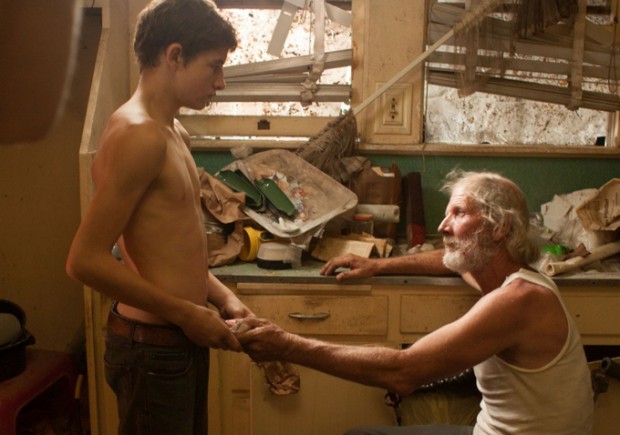
Can you talk about working with the dogs? Having the good dog that’s always in control and the evil dog that won’t just shut up.
Green: Nic is like a dog whisperer…
Cage: It’s true. I love dogs. Larry Brown bought the dogs, he had a passion for them. In fact, when he started making a little money that’s what he spent it on, dogs. He would study them. Faith was the name of the American bull dog that was really the star of the movie and she was a dog that would like to run off. She’d smell a cat or something and off she’d go. It took a little bit to get her to stay on her mark and be in the scene, but she was a real sweet dog. I don’t know where she is now. I know she was up for adoption.
Green: That was her first movie.
What about the other dog? The timing on that dog was perfect…
Green: That dog had done some shows, man. We were obviously dealing with things like animal violence, things we wanted to be very ethical about, and our local animal wrangler was on point and brought in a dog that she knew would be pro and give us some some grizzly intentions without having connection between two animals. I learned the trick from that movie Amorres Perros. You would have playful dogs playing drag ass, and add some vicious sound effects, and all of the sudden you got pretty off-putting things.
When I was watching, I recalled the character of Ben in Leaving Last Vegas. Did you have that in mind as well?
Cage: No, I didn’t. I saw them as two entirely separate characters. Ben is someone actively drinking himself to death by design by will. He wants to die. Where as Joe wasn’t really someone who was on a death trip, in my opinion. He was a pretty together guy, he had good relationships with people in the community, he showed up for work everyday, he paid everybody. He was fair, two different kinds of characters entirely.
David can you talk a little between the connective tissue, if there is any, between this film and Prince Avalanche? You made them right on top of each other and they’re taking place in the same location. Can you talk spiritually about the connective tissue?
Green: I was in development on them at the same time and as I was location scouting for that film, I was trying to woo Nic to be in this movie. He came out to Austin and drove around in the ashes and remains of the state park forest fire with me, so it was kind of cool to overlap them in a way. I think there is a spiritual connection between the two projects. There’s something about mother nature’s efforts and the catastrophic nature of a forest fire and there’s something very intimate and peculiar about a man that takes a hatchet with poison and takes at a tree on his own will. As much as my films have been strange studies of masculinity, I think there’s a template or backdrop. I’m always fascinated by where we are, who are these people in this place in this time. In a lot of the locations we shot right across the highway were we shot Avalanche. In Avalanche we were looking for where the fire ended. With Joe, we’d cross the street where life began again. With a little more hindsight and reflection I’ll be able to connect them. We made them back-to-back and I feel one of them is certainly a little funnier and one of them is a little of darker. It’s up to you decide which one from your own personal perspective, but for me, I think Joe is hilarious.
The women are mostly in the background. Can you talk about that?
Green: There were two characters, two female characters, that we shot substantial amounts from the novel. One being Joe’s ex-wife and one being a woman he meets at a bar. And something about those felt like they were detours for another film. Because this was a portrait, the study of Joe, the masculine fabric of his character. We had great performances, two great actresses, and you see little glimpses of them. One of them he just pulls up next to her and rolls down the car window half way and looks at her — we know there’s substance. I like knowing that there’s ambiguity there for the audience. Who is this person? Have I seen her before? We as an audience get to wonder about it. When I spelled it all out, it felt it was too distracting about to what this particular movie was about.
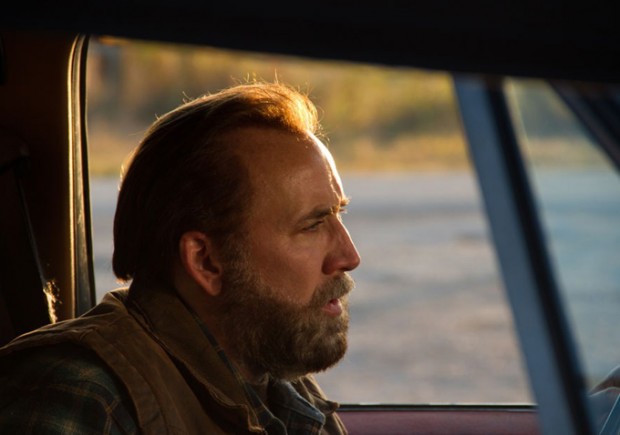
There’s a line in the film that stood out to me and it’s said to Joe, “Can’t get my hands dirty every little thing I did.” Do you feel this idea of getting your hands dirty applies to your life whether it’s your career or otherwise?
Cage: I certainly understand that line. I understand the need to have strength. I have friends, I won’t mention any names, could be liabilities. They want to go jail you don’t want to go with them. You have to try and not get your hands dirty in every little thing.
You were talking about the connective tissue between Prince Avalanche and Joe. Does that extend beyond Joe to Manglehorn, and possibly The Line, which you’re reportedly going to be directing?
Green: I’m not sure about The Line, but it definitely does to Manglehorn. I really think it’s a strange Texas trilogy. There’s a movie called Manglehorn I’m editing right now with Al Pacino, Holly Hunter, Harmony Korine, Chris Messina, a strange cast of characters. I think a lot of it is when I moved to town, I’ve known Austin well, I grew up in Texas, but when I started to look at it through a lens of a camera and finding these faces and voices and what appealed to me about the region, about the beauty of the landscape. In the case of Manglehorn, it’s more of an urban movie, but the story of three wandering souls looking for their place in a somewhat magical journey, Manglehorn heightens that and is actually magical, but definitely the same melancholy structure and looking for hope in life and love. I haven’t polished that movie off yet so I’m not really sure exactly what it is at the end of the day, but it came from a very similar place, a similar heartbeat.
Can you talk about the evolution or the genesis of the “pain face” sequence?
Green: About 2,000 years I put together a script called Heartbreaker Incorporated, which never got made. In that script I put a line there, and I never found a place that it made sense or it could work. I thought maybe with Joe it could work. I don’t know how it came to me, I think i was looking at old commercials of the Marlboro Man and it was always this guy squinting. You look like you’re in pain, yet you’re smiling. Is that an icon of cool? Is that what it means to be cool? Then I broke it down, I did the math on it, make a face of pain and smile — yeah, that’s cool. I thought I’d put that concept into this movie. We’ll make an anatomy of a cool face, make a face of pain, now smile through it. Now you’re cool. That’s how it happened.
What about the line where you say, “You’ve made mistakes, but people in town won’t outlive those mistakes”? Did that come from you, or the book or David?
Cage: That’s a very Larry Brown, honest statement. Once you get on the bad side of the law they’re not going to let you forget it. Which is very true.
The hatchet work you do in the wooded area is a very backbreaking work. Do you have any personal experiences with labor intensive work? What’s been the most backbreaking work you’ve done in your careers?
Cage: I use to sell popcorn at the Fairfax movie theater in Los Angeles. That was my first job. I took the tickets, as well. I was also the usher in that movie theater. I was trying to figure out how to get from selling the tickets to the screen. I’m watching the movie and one guy one day is smoking in the movie theater and my boss said you have got to tell him to put it out. I went up the guy, “I’m sorry, sir. You’ve got to put your cigarette out.” He just took one big puff, he had some girl around, and he blew all the smoke in my face and I quit. That was the most backbreaking job I’ve had. My dad said, “Go back to the movie theater and get your job back.” I had to beg the boss to give me the job back.
Green: I used to insulate attics. I was the little guy, so they’d send me into the cramped areas and that was crawling around in small spaces, and that was in North Carolina, that was pretty intense in the summer. I also did a weird job where I was working at a doorknob factory and I could only work 20 hours a week but they paid me real well to dump doorknobs in acid. They’d bronze these chrome doorknobs. It was just me and this taskmaster dunking doorknobs all day in big tubs. I really worked up my shoulder muscles.
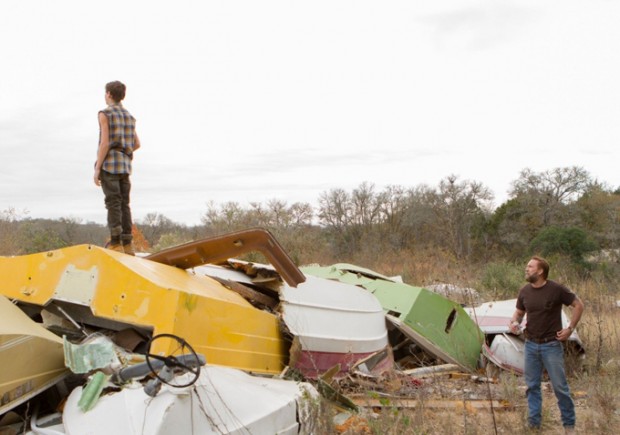
You show a lot of body language. When you act a scene do you act like that was the last scene of your life?
Cage: Believe it or not, I have this mantra before I start a movie where I want to treat every film I’m making as though it were my last. Meaning, it doesn’t matter what the genre, what the movie, I want to give 100%. I want to give it my all and try to get close to whatever vision I have in my head for the part. I don’t know if that answers your question. Body movement has always been very important to me. My mother was a dancer, a modern dancer. I take dance seriously. I’m not a dancer, but the way I move in a character is important.
With movies that are based on books, filmmakers have to make certain cuts to the novel. If somebody were to make movie about your life, what kind of cuts do you think people would make?
[laughter]
Cage: I don’t think I’d cut anything. I don’t think it’d fit in one movie. It might have to be like an episodic thing.
I was interested in the film’s cutting, where you have another scene start visually while you’re still verbally back in the previous scene….
Green: I get super excited to see what’s going on next. I worked with this editor Colin Patton and he was an assistant editor I had for several years on several movies. I’d see the strange way he’d approach narrative. So when it came time to make Prince Avalanche and we didn’t have any money to pay my big hollywood editor, I said, “Hey Colin, do you want to come edit this movie for me?” What I love about Colin is he brings a really fresh, innovative way to look at a scene. Sometimes rhythmically, he finds a way to put voices from other scenes in previous scenes and intercut them in a way where they’re not flashbacks or flash forwards. There is nothing traditional about it, it just feels organic and it feels correct. He comes from a visual arts background and a technical filmmaking background. I like his approach in that way. In a lot of scenes it brings anxiety, plant a little seed of discomfort while you’re starting to settle in, just when you fell like you got your groove…
In terms of your chemistry on screen did you guys go through any bonding prior to the film, in order to get that on screen chemistry?
Cage: We read through some scenes together with David and I knew right away I could really care about that person. What do you think?
Sheridan: Yeah. You’re a pretty easy person to get along with.
Can you talk to us about getting up in the morning and seeing that beard?
Cage: The beard was really important to David. When you look at the book and see Larry’s picture, Larry’s got a nice beard. I think there’s a physical resemblance between the two of us. I just finished working with Paul Schrader, the only thing he wanted to know is, “Is the facial hair real?” Yes, it is. Absolutely is real. I want that on record.
Why was it important that he had that?
Green: In looking to cast Joe, my first instinct when I read the book way back, is this is Robert Mitchum. Whenever I read the book I’m thinking about the movie, I’ve been that way since I was a little kid. I’m thinking about Robert Mitchum, someone that has the sense of width, of masculinity and dramatic ability, and Nic was the only guy — hen I started to think about the reality of putting this project together — that carries those with gusto, has the Oscars to prove it, the bad-ass action movies to prove it, has the hilarious comedies that I can quote to prove it. I really wanted that complicated texture. I wanted to bring Larry out to the show. There is a resemblance if you look at images of Larry and Nic. There’s definitely a very vivid resemblance and when I imagined that I couldn’t get it out of my mind. He’d never sport it for a movie as far as I know.
Cage: First time.
Going back to Nic and Tye, Nic, I find one of the things that’s great about you as an actor you’ve always been really good about working with the younger actors or children. What do you find enjoyable about that experience and what was unique about working with Tye?
Cage: Well Tye is just an exceptional talent. We know that. We’ve seen it time again in his performances. I like to work with young people, because young people haven’t had their dreams kicked out of them yet. Full of confidence, and imagination, and vision, and when they score that all gets empowered. Tye was a great example of that. So yeah, I do prefer to work with younger people.
You’ve worked with three Austin-based directors, Terrence Malick, David, and Jeff Nichols. What have you taken away from them?
Sheridan: Each one has a different style of working. Terrence Malick is super spontaneous and David as well, but he stays a little more off book. You never know what you’re going to be shooting that day. Jeff Nichols is solely based of his script. You know the schedule for like three weeks before you shoot it. With David, you show up you do the scene, you might change it in a couple ways or take out a couple lines. You never know. I love working with Texan filmmakers, I’ve worked with so many talented great directors. I always try to take away one thing I like they do. I was just working with a director, his name is Rodrigo Garcia. There’s one thing I love that he did, he always got variations. I think that’s important because when you get into the editing room you never know what’s going to happen. And a lot of directors do this. I thought it’s always a smart thing to do. One day hopefully, maybe I can take some of these and incorporate them into my movies when I start directing. I’m very fortunate to work with the talented directors I have.
Tye, are you looking forward to any particular type of role now? The roles you’ve have had in these last three movies are somewhat similar. Do you have something else in mind?
Sheridan: I would love to do a movie where I don’t have to wear dirt on my face. I’m allowed to shower.
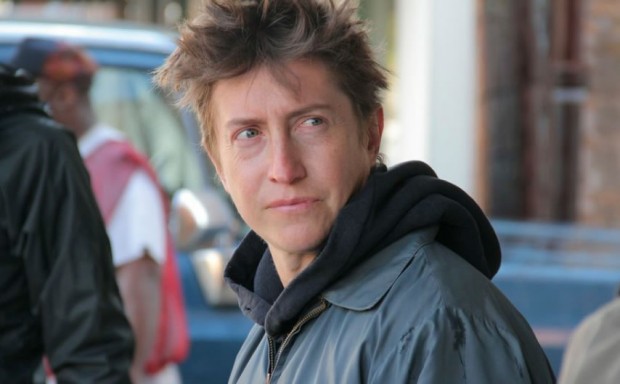
Joe hits limited release and VOD on Friday, April 11th.

